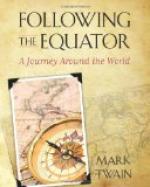A clergyman was asked to guess what was in a box on a table. It was a vellum fan painted with the shipwreck, and was “one of Virginia’s wedding gifts.”
April 18. This is the only country in the world where the stranger is not asked “How do you like this place?” This is indeed a large distinction. Here the citizen does the talking about the country himself; the stranger is not asked to help. You get all sorts of information. From one citizen you gather the idea that Mauritius was made first, and then heaven; and that heaven was copied after Mauritius. Another one tells you that this is an exaggeration; that the two chief villages, Port Louis and Curepipe, fall short of heavenly perfection; that nobody lives in Port Louis except upon compulsion, and that Curepipe is the wettest and rainiest place in the world. An English citizen said:
“In the early part of this century Mauritius was used by the French as a basis from which to operate against England’s Indian merchantmen; so England captured the island and also the neighbor, Bourbon, to stop that annoyance. England gave Bourbon back; the government in London did not want any more possessions in the West Indies. If the government had had a better quality of geography in stock it would not have wasted Bourbon in that foolish way. A big war will temporarily shut up the Suez Canal some day and the English ships will have to go to India around the Cape of Good Hope again; then England will have to have Bourbon and will take it.
“Mauritius was a crown colony until 20 years ago, with a governor appointed by the Crown and assisted by a Council appointed by himself; but Pope Hennessey came out as Governor then, and he worked hard to get a part of the council made elective, and succeeded. So now the whole council is French, and in all ordinary matters of legislation they vote together and in the French interest, not the English. The English population is very slender; it has not votes enough to elect a legislator. Half a dozen rich French families elect the legislature. Pope Hennessey was an Irishman, a Catholic, a Home Ruler, M.P., a hater of England and the English, a very troublesome person and a serious incumbrance at Westminster; so it was decided to send him out to govern unhealthy countries, in hope that something would happen to him. But nothing did. The first experiment was not merely a failure, it was more than a failure. He proved to be more of a disease himself than any he was sent to encounter. The next experiment was here. The dark scheme failed again. It was an off-season and there was nothing but measles here at the time. Pope Hennessey’s health was not affected. He worked with the French and for the French and against the English, and he made the English very tired and the French very happy, and lived to have the joy of seeing the flag he served publicly hissed. His memory is held in worshipful




